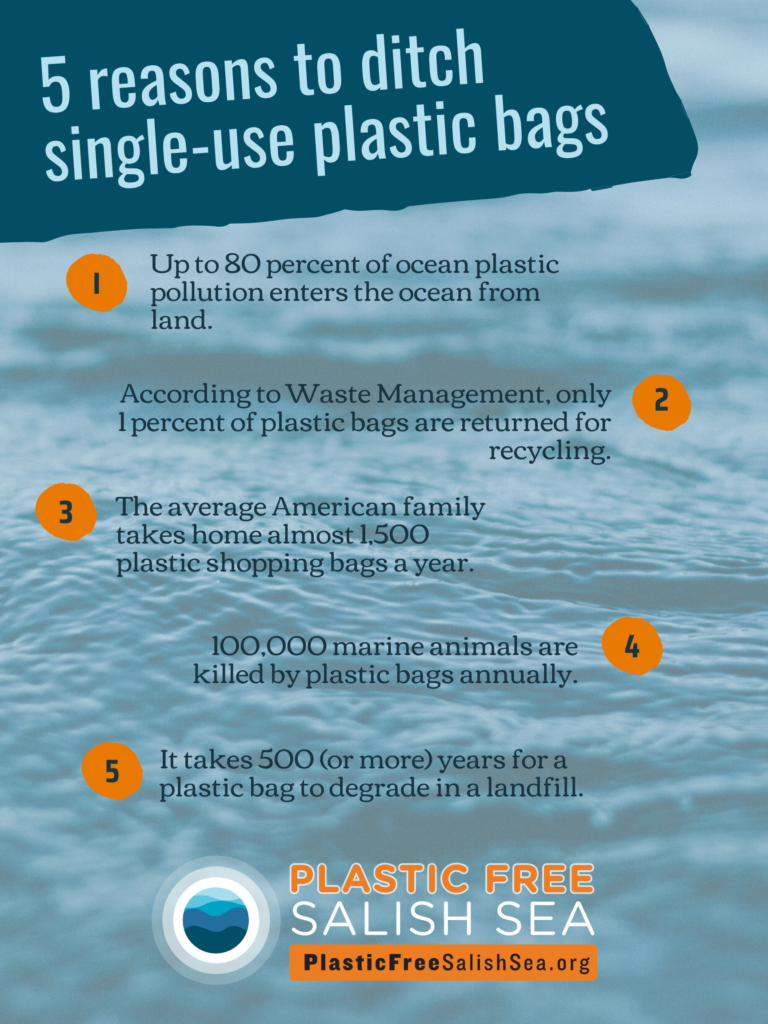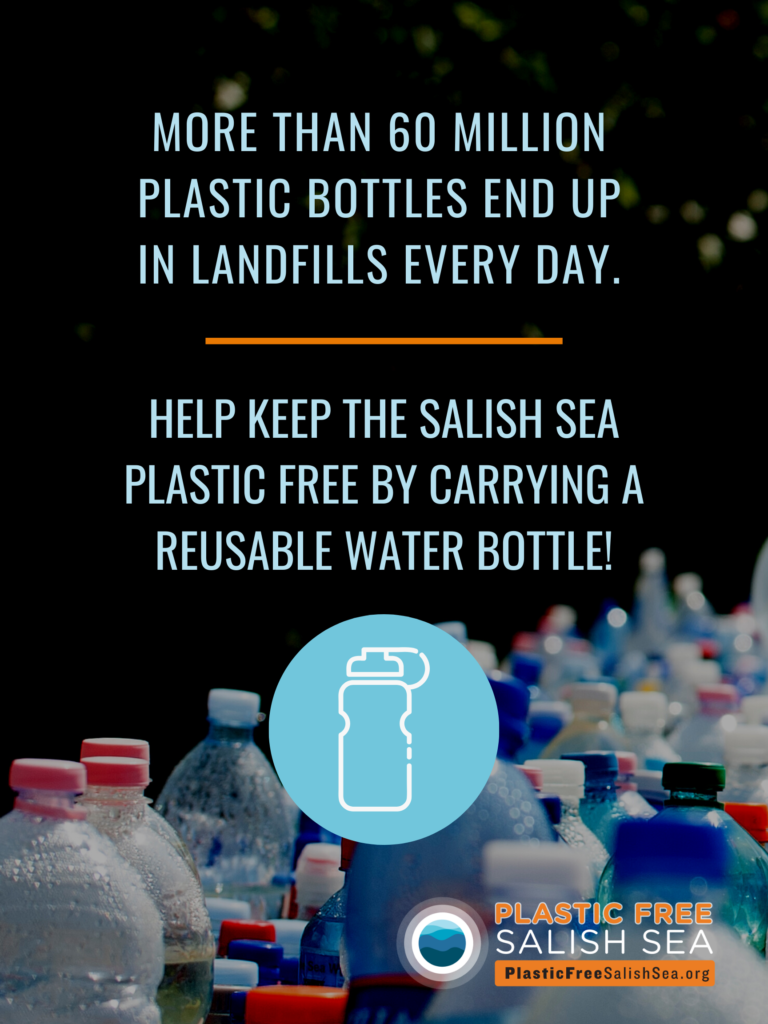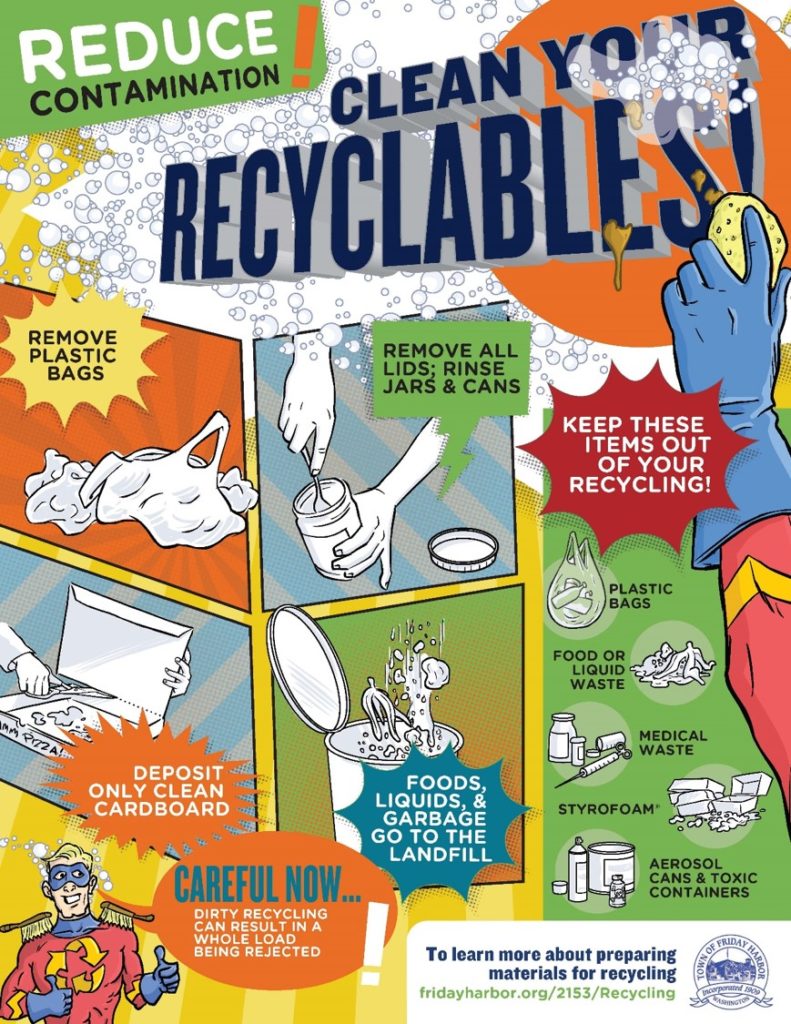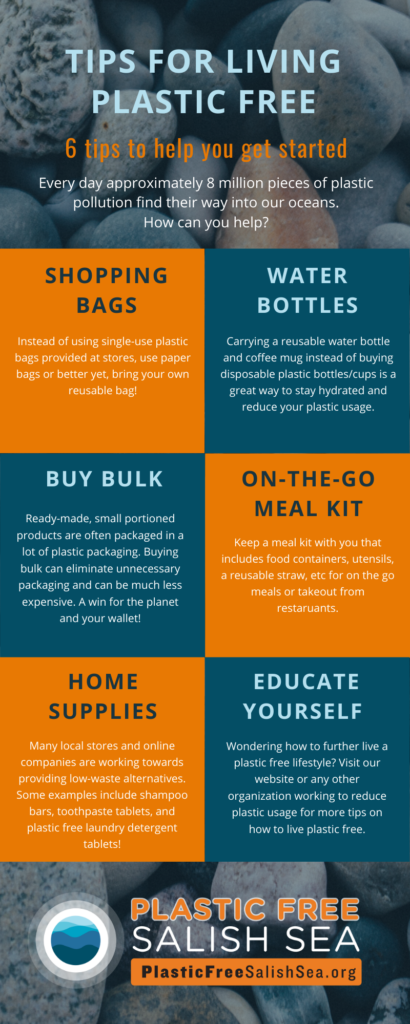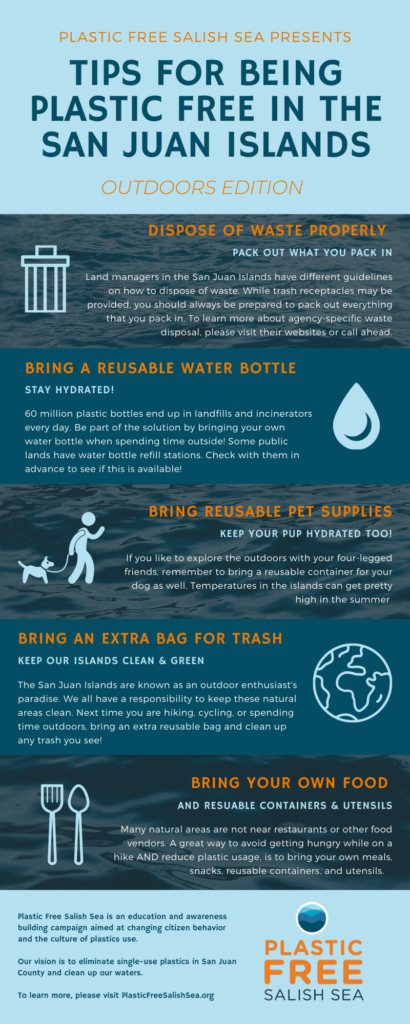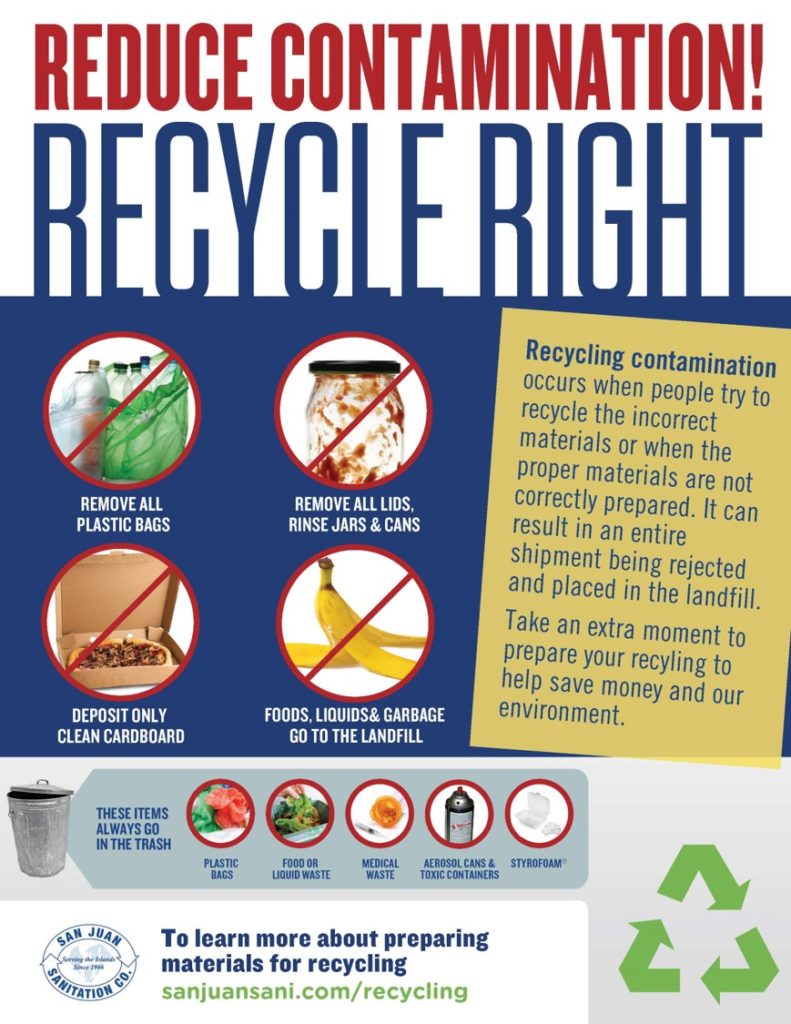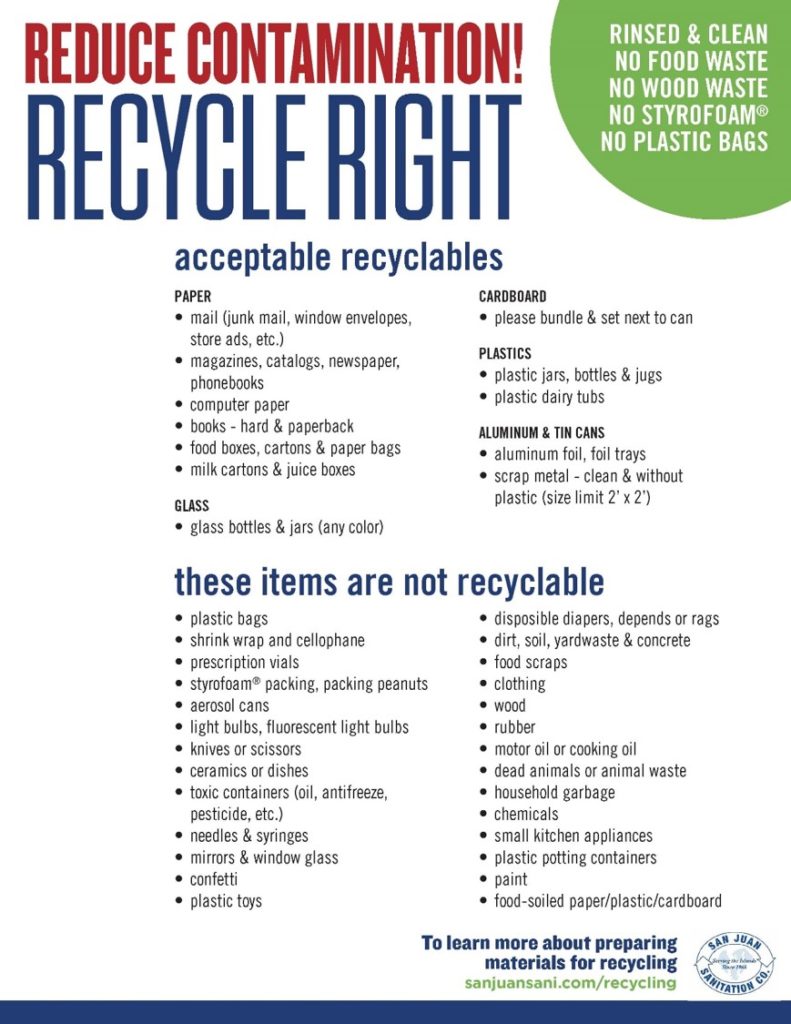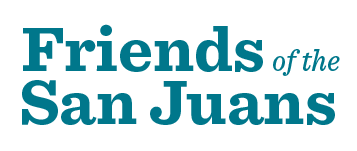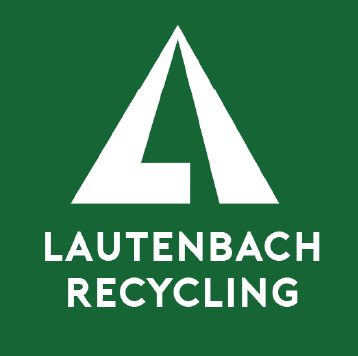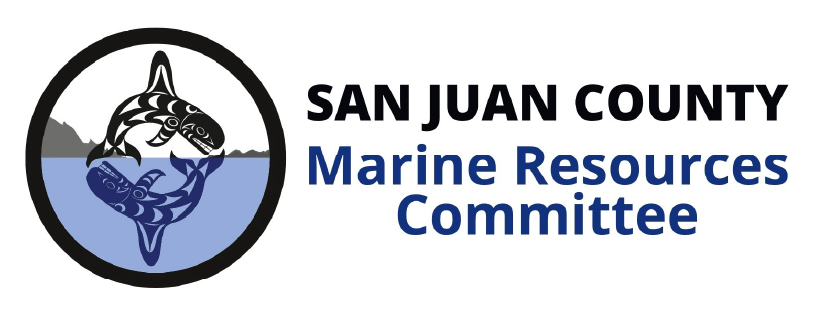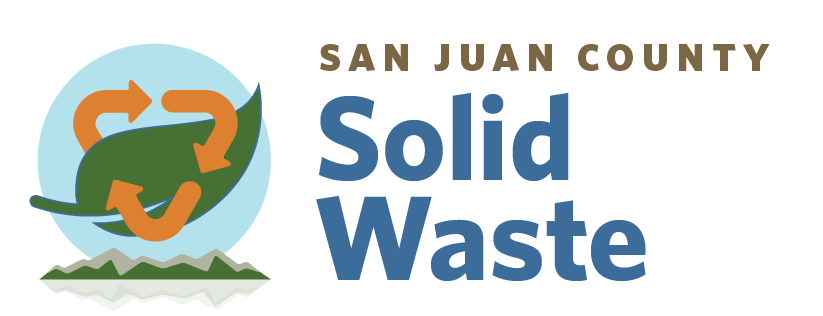Local Resources for PFSS and Solid Waste
San Juan Island Solid Waste Station
The solid waste station has been operated by Lautenbach Industries since 2014. They offer both recycling and garbage services.
212 Sutton Road, Friday Harbor
www.sanjuantransferstation.com
Orcas Island Solid Waste Station
Orcas Recycling Services, a not-for-profit corporation has been operating the facility since 2013. ORS offers recycling, garbage, used item reuse, hazardous waste, and composting services. The organization also provides community outreach and workshops.
3398 Orcas Road, Eastsound, Orcas Island
www.exchangeorcas.org
Lopez Island Solid Waste Disposal District
A community-run organization, the Lopez Solid Waste Disposal District manages and operates the station to include self separated recycling, garbage disposal, and free items available for donation and reuse. The organization also provides community education and outreach that support it’s Zero Waste Mission.
2419 Fisherman Bay Road, Lopez Island
www.lopezsolidwaste.org
Town of Friday Harbor
The Town of Friday Harbor collects garbage, recycling, and yard waste for Town residents.
212 Sutton Road, Friday Harbor
www.fridayharbor.org/2151/Refuse-Recycling
San Juan Sanitation Company [WA SJC Certified Hauler]
This state-approved waste and recycling hauler can arrange services for your home or place of work.
279 Gravel Pit Road, Eastsound, Orcas Island
www.sanjuansani.com
1-800-RECYCLE Online Tool and Hotline
This resource helps you identify additional recycling options for both publicly-owned facilities as well as private businesses
Online, or call 1-800-RECYCLE, option 3 for Washington
http://1800recycle.wa.gov/ (Enter zip code, then begin typing material name into material box)
Treasure Chest Sales & Services
This is a nonprofit recycling facility and thrift shop located on San Juan Island, WA.
6739 Roche Harbor Road, Friday Harbor, WA, 98250
Legislative Resources
Zero Waste Washington
Zero Waste Washington is working hard with partner organizations and agencies to support strong zero waste policies during the 2024 WA legislative session. Learn more about the 2024 legislative session, which bills passed, which did not advance and how to contact your legislators.
https://zerowastewashington.org/legislative-work/
Plastic Free WA
A coalition of individuals and organizations protecting our land, water, and wildlife from plastic pollution. One way Plastic Free WA works towards solutions is through making legislative progress at the local and state level towards eliminating harmful plastics. Learn about the successes and challenges facing Plastic Free WA.
https://sites.google.com/publicinterestnetwork.org/plasticfreewashington/solutions/progress-in-washington?authuser=0
Zero-Waste Living Resources
Going Zero Waste
Breaking zero waste living down into a simple step-by-step process with lots of positivity and love. A blog and website started to help others improve their personal health, improve the health of the planet, and most importantly the author wants everyone to know their choices matter. Big or small, the changes you make add up to a huge positive impact.
www.goingzerowaste.com
Resources include:
- How to get started on a zero-waste journey,
- Regular blog posts
- Shop with product ideas on best plastic replacements
The Zero Waste Collective
An online collective with the goal of educating and inspiring people worldwide to live more sustainably by reducing their plastic waste. Provides practical content in the form of blog posts and social media to help you make informed decision to reduce your waste, improve your life, and have a positive impact on people and the planet.
www.thezerowastecollective.com
Resources Include:
- Resources and guides for inspiration and information on zero-waste living
- Sustainable brands and products
- A supportive community
Resources to Report Marine Debris in the Salish Sea
Northwest Straits Foundation
The Northwest Straits Foundation work to remove derelict fishing gear from Puget Sound. Since 2002, they have removed more than 5,800 derelict fishing nets from Puget Sound—restoring more than 870 acres of precious marine habitat. Learn more about their derelict gear removal efforts, report lost gear, and check out their ‘Catch More Crab’ campaign.
https://nwstraitsfoundation.org/derelict-gear/
WA State DNR Marine Debris Removal Program
Derelict marine debris is a persistent threat to Puget Sound. The DNR Marine Debris Removal Program (MDRP) is leading efforts throughout Puget Sound to remove marine debris from our marine and estuarine waters. Projects include removing creosote-treated wood, docks, floats and other derelict floating objects.
https://www.dnr.wa.gov/MarineDebris
My Coast
Washington MyCoast is a project of the Washington Department of Natural Resources, in collaboration with other project partners, including US Geological Survey, Washington Sea Grant, the Snohomish County Marine Resource Committee, and the Northwest Straits Initiative. Use the app to report creosote debris, derelict vessels, and large marine debris.
https://mycoast.org/wa
Organizations Working Towards a Plastic Free Future
Plastic Free July
Plastic Free July is a global movement that helps millions of people be part of the solution to plastic pollution – so we can have cleaner streets, oceans, and beautiful communities. It is a key initiative of the Plastic Free Foundation that is working towards a vision of seeing a world free of plastic waste. From humble beginnings in 2011, the award-winning Plastic Free July campaign is the result of years of hard work.
www.plasticfreejuly.org
Resources include:
- Educational toolkits
- How to take part in the annual Plastic Free July challenge
- Resources and partnerships
Break Free from Plastic
Break Free from Plastic is a movement that was officially launched in 2016. The coalition works towards environmental protection and social justice by addressing the entire production cycle of single-use plastics and working towards systematic change.
www.breakfreefromplastic.org/
Resources include:
- Various educational toolkits,
- Research & publications,
- Opportunities for community collaborations.
Leave No Trace
Leave No Trace is a national nonprofit that was created in 1994, although the “no trace” philosophy was first coined by land management agencies in the early 1980s. Today, Leave No Trace partners with land management agencies across the country are educating individuals and communities about how to minimize their impacts when recreating outdoors.
lnt.org/
Resources include:
- Educational trainings
- Research about public land management in the US
- Educational and interactive activities & guides for all ages
Plastic Pollution Coalition
Plastic Pollution Coalition is a global alliance and social movement dedicated to working towards a plastic-free world.
www.plasticpollutioncoalition.org/
Resources include:
- Various projects
- Facts about the plastic free movement
- Links to many guides for plastic free living
Heal The Bay
Started 35 years ago in Los Angeles, California, Heal the Bay is a nonprofit dedicated to keeping the coast and waterways in the area clean. In regards to their plastic work, they focus on education and outreach in local communities, campaign for legislative change, host beach cleanups, and work with local businesses and organizations towards sustainable solutions. While many of their educational resources are localized in the LA area, they have many creative resources that offer lots of inspiration and creative ideas.
healthebay.org/education/
Resources Include:
- Ocean Heroes Activity Guidebook, filled with engaging activities and information for kids (available in English and Spanish).
The JellyFish Project
The JellyFish Project is a coalition of musicians dedicated to protecting the environment. They have a unique and innovative approach to creating change from the stage, literally! They provide two programs: School Presentations and From the Stage. From The Stage is their primary focus, where they partner with artists who commit to speaking about the environment to their audiences during their shows.
www.thejellyfishproject.org/
Resources Include:
- Plastics Resource Guide; a K-12-focused list of numerous organizations that are committed to plastic reduction & education
- From the Stage program
- School Presentations
Plastic Oceans Foundation
Plastic Oceans Foundation is a non-profit organization raising awareness about plastic pollution through digital media and films. They have chapters in Canada, Chile, Europe, and Mexico. The organization first started when they helped distribute the film, A Plastic Ocean, a film about how plastics work up the food chain – eventually into us. Since then, they have dramatically expanded their resources.
plasticoceans.org/
Resources Include:
- Links to their films
- A youth-centered educational guide
- Research & reports
- Infographics and other visuals
5 Gyres
The 5 Gyres Institute is a non-profit that was founded in 2009 and has been in special consultative status with the United Nations Economic and Social Council since 2017. In 2008, right before 5 Gyres was founded, Marcus Erikisen and Anna Cummins built a JUNK raft out of plastic water bottles and an abandoned airplane fuselage. Marcus then sailed the raft from California to Hawaii to raise awareness about plastic pollution. Today, the organization focuses on blending science and education.
www.5gyres.org/
Resources Include:
- Virtual 5 Gyres Trash Academy, where you can sign up for lessons on the history of plastic and future solutions.
- “Shop sustainably” section where you can find brand recommendations for commonly used products.
A Plastic Planet
A Plastic Planet was founded in 2017, with a mission to “ignite and inspire the world to turn off the plastic tap.” They have a multifaceted approach, utilizing media coverage, industry support, lobbying, and education to inspire change.
aplasticplanet.com/
Resources include:
- Unique and Modern Visuals
- “Materials Library”: a resource for designers (and everyday individuals!) wondering what they can use instead of plastic. It has a profile for each material, including uses, pros, cons, etc.
Breathe Conservation
Breathe Conservation is an advocacy and educational non-profit based in South Africa. Their mission is to reduce plastic reliance by organizing swimming meet-ups and by providing educational packages to help businesses reduce their reliance on single-use plastics.
breatheconservation.org/
Resources include:
- Swimming meet-ups
- Educational packages for businesses
Ellen McArthur Foundation
The Ellen McArthur Foundation is a charity first created in 2010 dedicated to transitioning to a circular economy (keeping materials in use, utilizing regenerative & circular systems, reducing/eliminating waste from production). Their website is a learning hub – with many educational resources.
www.ellenmacarthurfoundation.org/
Resources include:
- Research & reports
- Online events
- Courses
- Higher education resources
- Toolkits for policymakers
Surfrider Foundation
Surfrider Foundation is a chapter network of passionate volunteers working to protect our oceans and beaches through activism, education, and legislative change. One of their primary focuses is plastic pollution. While there are no chapters in San Juan County, there are active chapters in Tacoma, Seattle, Bellingham, Victoria, and on the Olympic Peninsula. Visit the chapter websites to learn more.
https://www.surfrider.org/programs/rise-above-plastics
Resources include:
- “Ten ways to rise above plastics”
- An ocean friendly restaurants list
- “Rise Above Plastics Activist Toolkit”
- Local Chapters
UPSTREAM is an organization dedicated to changing our society’s throw away culture through business innovation, policy change, and culture change. UPSTREAM helped create the international movement, #Breakfreefromplastic.
upstreamsolutions.org
Resources include:
- Reports
- Guides
- COVID-19 guidance
- Videos
- Podcasts
An Ocean of Good
The Marine Education and Research Society have launched their Ocean of Good campaign to educate and empower change surrounding plastic pollution. Check out these great animations to learn more about the ways plastics impact animals through entanglement, contamination, and microfibers. For more information please see https://www.mersociety.org/oceanofgood.
